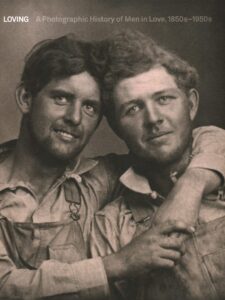
In-person seating is first come, first served. Register on Engage here. You can register for the live Zoom here!
“In the late 1990’s Neal & Hugh started collecting photographs purely by accident. The first photograph came from an antique store in Dallas. The photograph was of two men in a loving embrace mixed within random photos of a Dallas neighborhood from the 1920s. [Their] collection of over 2800 vintage photos of romantic couples spanning the 100 years between the 1850s and 1950s is the basis for [their] book.
LOVING: A Photographic History shines a new light on the most written about, dramatized, or filmed emotions — love. The pages of our book portray love, but also courage — the courage that it took to memorialize that unmistakable look that occurs between two people in love. LOVING: A Photographic History celebrates a loving past. A past that points towards the future. It’s message is for everyone. It’s universal.”
Feel free to send questions, comments, or accessibility concerns to [email protected].
In recognition of the 20th anniversary of the historically devastating attacks on September 11, 2001, the Office of the President and the Center for Religious and Spiritual Life invite all members of the Wheaton community to join for a brief remembrance ceremony where we will hear from some of our community members and local first responders as well as share in a moment of silence for the many lives lost then and amidst the current turmoil in Afghanistan.